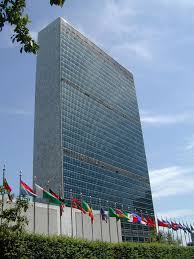NOTE: This guest post was written by Morgan McMichen. Morgan is a graduate student at the Seton Hall School of Diplomacy and International Relations. Her specializations are in International Organizations and Global Negotiations and Conflict Management. Morgan’s interests are the function of international institutions in a global society and negotiation as a means of deterring conflict among multinational actors.
– February 10, 2017
“Gender, Science, and Sustainable Development: The Impact of Media”
In 2015, the UN General Assembly adopted resolution A/RES/70/212 declaring February 11th International Day of Women and Girls in Science. This International Day came thanks to the collaboration between the Royal Academy of Science International Trust (RASIT) and the Maltese government in ensuring the adoption of the resolution. The second commemoration was dedicated to the impact of media on gender, science, and sustainable development.
You may view the commemoration here.
The Forum was comprised of a variety of distinguished representatives including princes and princesses, ambassadors, government officials, doctors, reporters, directors, and even children. I found this vast array of stakeholders to be very useful considering that the forum was designed to “explore ways in which both common global frameworks and regional, sub-regional, national, and local frameworks promote knowledge about and support for women and girls in science.” It was broken up into three sections: “Welcoming Remarks”, “Gender, Science, and Sustainable Development: The Impact of the Media”, and “Development Cooperation Perspective on the Role of Women in Science and Media in Implementing the SDG’s.” The sapience gained from the forum will be used in policy construction to build a foundation supporting Women and Girls in Science and the impact of Media in achieving SDG’s by 2030 as well as gender equality in science. In 2018, the Forum plans to generate a progress report on the outcome document from this event.
Without highlighting and summarizing the remarks of all, fifty or so, distinguished speakers, I would like to point out the moments that made the most impact on me. First and foremost, a statement made by Secretary General Guterres delivered by Ms. Lakshmi Puri, “On this International Day, I urge commitment to end bias, greater investments in science, technology, engineering and math education for all women and girls as well as opportunities for their careers and longer-term professional advancement so that all can benefit from their ground-breaking future contributions.” This statement resonated with me for two reasons: 1. That women have already made many “groundbreaking” contributions in the sciences, yet few have been recognized for these contributions, and 2. That in 2017, we are still asking for gender equality in all aspects of society, science included, so that we can make more innovative improvements, but also to finally receive recognition for the ones we’ve already made. This idea can even be understood by small children. Miss Tayla Ozdemir , 10, of “Girls for Girls in Science” was passionately discouraged when she told us, “No one hears about women in science or their contributions.”
As women make up half of the population, it is a wonder that they aren’t included in at least half of all decisions, institutions, and other societal processes. Throughout the event, there were many statistics offered such as “Companies with at least one woman on their board of directors perform 17-26% better”-Dr. Bahija Jallal, President of the Association for Women in Science. But for me, it was the personal stories that really “hit home”. Ms. Leona Alleslev of the Canadian parliament shared her story about rejecting a career in aerospace engineering. She was accepted to attend school for aerospace engineering, but as time went on, her self-confidence diminished and she no longer believed that she could do it anymore because of her gender. Society and the media have a large hand in creating these sorts of insecure realities for women and girls. She enjoys her job with the Canadian government but told us that she will always wonder “what if?”. It is stories like that which encourage us to push the boundaries and teach our little girls that they are the only ones standing in the way of their success.
This Forum did a wonderful job at bringing forth the biases that do exist in the media and how they can be diminished by girls and women refusing to surrender to the stereotypes and by men supporting equality for women. It was refreshing to see all the men and boys come forth to offer their support for women and girls and share their personal stories about how the women in their life have inspired them and to hear their dedication to the realization of gender parity. It also gave a space for actors from all sectors of society to come together and brainstorm on how to change the image of women and girls in the media but also how to collaborate with one another to achieve all 17 SDG’s by 2030. Mr. Nikhil Seth, Executive Director of UNITAR said it best when he said “None of the SDG goals or targets will be reached without the participation of women and girls.” He is absolutely right in his conviction. Though this Forum focused mostly on Women in Science, gender equality in all areas is important for a healthy society. In support of all women of all nations, I offer one final quote from Professor Joyce Harper, Founder of Global Women Connect, “To all the women-may we know them, may we be them, may we raise them.”
Related resources:
You can find live-tweets from this event on our Twitter page at https://twitter.com/SHU_UN_Studies
